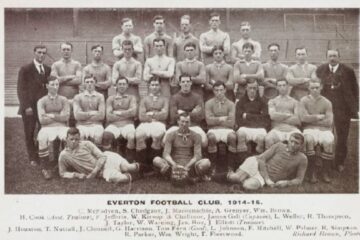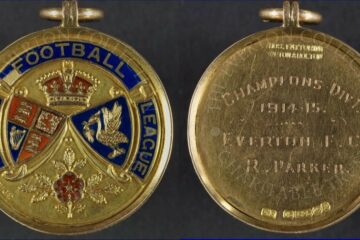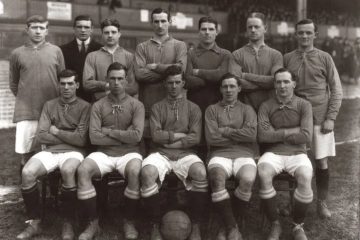Jack Brearley, a Prisoner at Ruhleben.

Located beneath the dark smoking chimneys of the gigantic Spandau Munitions Factory on the outskirts of Berlin, the harnessed horse racing track at Ruhleben was hurriedly turned in to an internment camp for the 5,000 or so British civilians who found themselves trapped inside Germany due to the outbreak of World War 1. The game of association football was still in its infant stages, and several of the men held captive, former professional football players, had answered an advertisement to come as trainers and help improve the standard of the game on mainland Europe. Liverpool born Jack Brearley was one of four former Everton players detained by the German authorities but he had played for several other clubs before arriving at Goodison Park.

Jack was baptised on 13 February 1876, at St Nathaniel in Edge Hill, Liverpool. He was the second child born in to the family home at 13 Arundel Street. His father William was a sailmaker while his mother had been born the daughter of a fisherman, on Back Sea View in Hoylake. The family later moved to Eden Street in Liverpool, and by 1891 were living at 1 Solway Street in Toxteth where their children now numbered six. Jack, by then fifteen years old, was working as a tobacco makers apprentice. He began his football career playing on the Shorefields, located at the bottom of Beresford Road, Toxteth, for a Liverpool South End side of the Liverpool & District League. It was from here, in 1895, that he joined Midland League side Kettering, where he spent one season.
Brearley then moved to Football League Division 2 side Notts County, and helped them to finish in top place. The Trent Bridge side then had to play a series of test matches against Burnley and Sunderland, to decide the promotion and relegation issues. In the final game, against Burnley at Turf Moor, Brearley scored the only goal to gain promotion for Notts County. He then accepted terms offered to him by Southern League outfit, Chatham, where he remained for one season.
Brearley next transferred his services to Millwall Athletic, also in the Southern League, and was in their side when they faced Southampton in the semi-final of the FA Cup at The Crystal Palace. The match, watched by a crowd of 60,000, ended in a 0-0 draw. Southampton won the re-play 3-0, played at Reading. Brearley then returned to Notts County, where he spent another season, before moving to Middlesbrough. It was from there that he joined Everton in the spring of 1902, for a wage of £4 per week. He made his debut in a rather sad set of circumstances.
Several weeks prior to Brearley joining Everton, England had met Scotland in an International match at Ibrox Park in Glasgow. The game had been in progress for thirty minutes when part of the wooden terracing collapsed sending the spectators crashing to the ground below. The game continued, but when the final analysis was revealed, twenty-five people had lost their lives, while many more were injured. The SFA, along with the FA, decided that Celtic and Rangers, accompanied by Everton and Sunderland, would play in specially arranged tournament to raise money that would go to help the families of the victims. Everton and Rangers met at Goodison Park, the game ending in 0-0 draw, and the replay took place at Ibrox theee days later. Jack Brearley, who took part in the game, scored for Everton in a 2-3 defeat.
He featured in the opening game of the 1902/03 season, away at West Bromwich Albion, and scored his first goal, four weeks later, in 3-1 win over Liverpool at Goodison Park. Mid-way through the season, following an injury to Sandy Young, Brearley was switched from inside-right to centre forward and on 3 January 1903, he scored a hat-trick in a 3-0 win over his former club Middlesbrough at Goodison Park. However, following the return of Sandy Young, he lost his place in the side and played his final game on 21 February in an FA Cup tie against Manchester United that Everton won by three goals to one. Jack Brearley had played twenty-four league and FA Cup games for Everton and scored eight goals. The following season he was offered terms by Everton on a wage of £4 per week, but refused to sign.
Liverpool came in with an offer of £150 to take Brearley to Anfield, but the Everton executive refused to release him. This news reached the ears of former Everton player John Cameron, now the player-manager of Tottenham Hotspur, who reacted immediately. The Scotsman travelled north and persuaded him to sign for the Southern League side for an undisclosed wage. Jack Brearley settled comfortably in the capital, living in 15 Foyle Road, when he married Emily Barlow, on 5 May 1905 at All Hallows Church in Tottenham. He spent four seasons at White Hart Lane, making 133 appearances and scoring twenty-four goals, before moving to Crystal Palace, where he remained for two seasons. Around this time, he opened an outfitting business in Beckenham but the venture did not appear to have been a success. Jack Brearley ended his football career as a player-coach, with his former club Millwall Athletic, before retiring.
The 1911 census records Jack and Emily living at 69 Mark Road, Wood Green, with their two children; John age three, born in Penge, and 10-month-old Arthur, born in Tottenham. Jack declared himself to be an out-of-work licensed victualler. Being unable to find a suitable position at home, Brearley joined the exodus of British professional footballer working as trainers in mainland Europe. He worked in Sweden and Austria before moving to Germany. He was with the Berlin based club Viktoria 89 at the outbreak of World War 1.
He was immediately instructed to report each day to a civilian police station until during a short spell in hospital, he was arrested and placed in Ruhleben Prison Camp, where he was joined by his former boss at Tottenham, John Cameron. Interned with him were Sam Wolstenholme and Walter Campbell who had also previously played football for Everton.
Brearley took part in all the sporting activities that were designed to relieve the boredom of captivity until the defeat of Germany on 11 November 1918. Food was always in short supply, and the inmates were eternally grateful to the food parcels that arrived from home. At the end of the war, civil unrest quickly broke out in Germany and the inmates, whose numbers were now reduced to 1,500 men, were liberated by a group calling themselves, ‘The Soldiers and Workers Council of Berlin.’ The council ensured safe passage to the railway station and issued them with the following declaration that they wished to be relayed to the people of Great Britain,
… It took four years for the German People – who never hated you – to come to their own and four years of endless privation and suffering to make our people realise they had been misquoted and misled. The people were slaves of a barbaric system – therefore – withhold any ill feeling of hatred. Do not hold the German people responsible for the deeds committed by its former Aristocratic leaders.
The British subjects were then transported to the port of Sasenitz on the Baltic Coast where two ships, supplied by King Haakon of Denmark, awaited their arrival. A British journalist, who witnessed the event, reported that they were dishevelled and immediately dashed to the washing facilities on board. (He also made reference to the many local children who clamoured around the two vessels begging for food.) Brearley and the party had a medical examination while being shipped to Copenhagen, where after taking a rest, they resumed their voyage and arrived at Hull on 27 November 1918.
Jack Brearley later settled at Southend-on-Sea where, it is believed, he worked as a waiter in the hotel industry. He also played cricket and was a leading member of the snooker team at the local naval and military club. However, the evil of war was again to cast its shadow over the Brearley family when their son Reginald, serving with the RAF Volunteer Reserve as wireless op/ air gunner in WWII, was killed in action and buried at Coxyde Military Cemetery in Belgium. He was twenty-one years old and had been living in 9 Marlborough Road, in the Thorp Bay area of Southend. John Brearley was residing at this address, when on 27 September 1944 he was knocked off his bicycle on Pier Head in Southend and died in the ambulance while on the way to hospital. He was sixty-eight. He is buried in Southend, at Sutton Road Cemetery.



